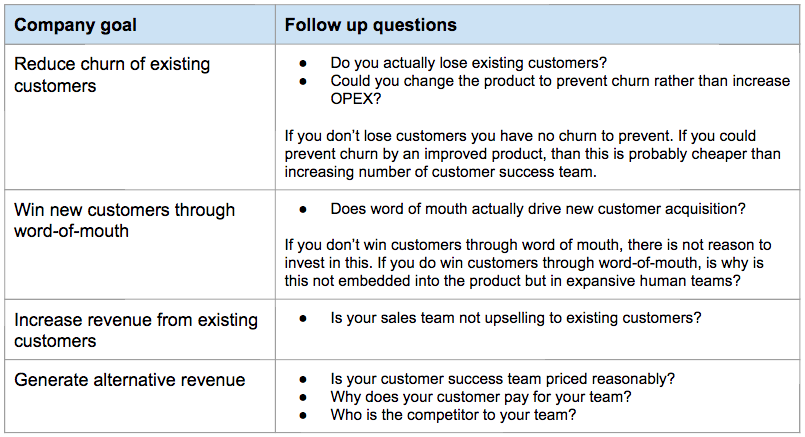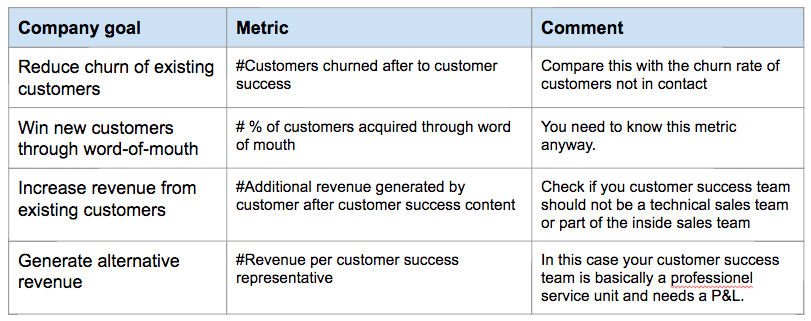OKRs and KPIs for Customer Success Teams
Again, a fast written article to get it of my chest. Appreciate your feedback to make it better.
Customer success teams tend to happen at a certain company stage. Usually when growth occurs and product, engineering and sales teams no longer want to handle the questions from customers. Plus, it is impossible to object to the notion of wanting to make customers successful.
Especially, when one also points to the book by the Zappos CEO and adds that Zappos was bought for 1.2$ billion. That is a true anecdote.
But, an anecdote is not an excuse of being clear how your customer success team fits into your business model.
That is true for three reasons:
NPS is meaningless by itself
Measuring and getting a high NPS (Net Promoter Score) is not the goal of a customer success team. Net Promoter Score means how likely are people are to recommend your product. This is a Marketing, Sales or Product metric, not a “customer success metric”.
At the moment, Netflix probably has the highest actual net promoter score in terms of generating new customers through people promoting Netflix to people they know. Yet, I have never been in touch with the customer success team of Netflix.
You don’t actually want a high NPS score, you want low customer acquisition cost. That’s a questions of sales and distribution tactics and not of asking people for their NPS score.
Or, to be more blunt: I’d give Wikipedia an NPS of 10/10 every day but I am pretty sure that my 25$ annual donation does not make it a great business model.
On the other hand, for all I know Herbalife preys on vulnerable people, is widely hated and in the center of many lawsuits by former customers. That does not speak for a great NPS. Yet, it’s market cap is at 85$ billion as of me writing this.
It’s a question of business model and product, not of “do you want happy customers?”.
Human support is expensive
The advantage of selling software products is that the marginal costs are close to zero. To provide one more Netflix account costs Netflix next to nothing. The problem is that well qualified customer success teams do cost a lot.
If your need for support increases linearly with additional sales then this need to baked into the unit economics of the product.
Who is not in customer success?
If there is a dedicated team for customer success, then what are the other people in the company doing? Is the goal of the product team produce a product that maximises the number of people that can’t use the product without a customer success team? Is the goal of the Marketing and Sales team to target clueless customers that need a lot of help?
Company Goals for Having a Customer Success Team
So you either account for customer success outside of the unit economics of your business, that would mean it is overhead. In this case you obviously want to minimise it. For example, by moving it down the value chain to your distributors, by replacing it through wiki’s and how-tos or by improving the product to minimise the need for it.
If that is not the case, then customer success has a part in your strategy. That then means it has goals that matter because your strategy matters. Find the goals below. At the same time, these goals serve as a check of whether customer success is part of your strategy. If your company does not have any of these goals carried by the customer success team then you know that it is overhead.
What should your customer success team achieve?
Company goals to customer success KPIs
Now, I understand that metrics are not everything. Metrics are only meaningful when they properly fit into the company strategy as we have seen above. At the same time, they are a good means to create an open discussion of what the actual goal is.
Simplified KPIs for customer success teams
Reduce churn of existing customers
In addition, you probably want to have the customer success team carry out a win/loss analysis (see other post here) so that you know why they churned. If they churn because they don’t need your product anymore then that’s a product problem, not a customer success problem.
Win new customers through word of mouth
This will massively depend on your customer acquisition game - is word of a mouth a demand driver. If yes, is that because of the value of the support? If that is true then you want to ask yourself whether your product has a high enough margin to pay for that and you want to account part of the cost to marketing.
Increase revenue from existing customers
Here, you are not preventing the loss of a customer (= churn) but actively work to increase revenue. Arguably, that is a sales metric and should be carried within sales and given elements like commission to align the incentives.
Generate alternative revenue
Potentially, customer interact a lot with you customer success team because it is free. That is not good. Everybody will love free help, no question. But if that does not lead to more revenue from the same customers (you need to prove this) or generate new customer (you need to prove this) then you are just giving stuff away for free. Why, should you pay for this time?
An interesting example on the consumer level would be toggl.com - after signing up you are immediately presented with the potential to use paid customer success. So as a customer you have the choice of figuring it out yourself or get paid help. That keeps the unit economics in check. Plus, it probably helps the product teams - problems that people pay for to get solve are probably not explained well enough.
Conclusion OKRs for Customer Success Teams
As always, the outcome is the same. Be clear what you want and don’t just do things because other people did it. Your business model is probably different.
Hope it helps and I am happy if you help me improve it or share it.

